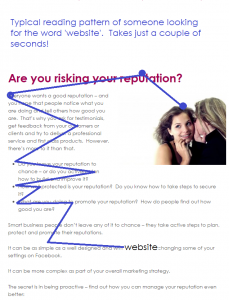 When it comes to writing to promote your business you want people to really get what you do, how good at it you are and what all round nice people you are – right?
When it comes to writing to promote your business you want people to really get what you do, how good at it you are and what all round nice people you are – right?
OK – now think about your reaction when you receive information from a possible supplier. How much detail do you want about all the things they do, how good they are and how lovely they are to work with? No?
It’s really hard to remember that however excited we are about our own businesses our potential clients want facts. They want to know what’s on offer – in simple terms – and what they get if they choose to work with your company.
Online, onscreen, we scan; we look for the key words we’re interested in and then skip through the text of web pages, emails and brochures, looking for what we want. That means we’re not actually reading, we’ve just tuned our eyes to a specific word or phrase and will keep scanning the text until we find it – or run out of patience.
A webpage cluttered with creative text or full of self-congratulatory content won’t hold a potential client for long. The more ‘fluff’ they have to dredge through to find the nugget they’re looking for the more likely they are to leave and look for easier meat to digest, in other words, a website that just tells them what they want to know without making them work too hard.
An email that arrives with a catchy subject line may get opened, but if it looks long and complicated it won’t get read to the important ‘call to action’. It’s almost like having a simple message and then hiding it in lots of verbiage and expecting the recipient to play ‘hunt the info’. Who has the time?
The same applies to sales letters and marketing flyers, the message needs to be engaging, relevant to the reader and focused on a call to action. What’s more the message needs to be presented in the right order, with the right keywords and a strong reason for the reader to do something.
Every one of us has received long rambling emails and landed on websites that make it almost impossible to find out what you want to know. Why should our readers be any different?
Next time you sit down to write something to promote your company, think carefully if you’d read it if it landed on your screen.
